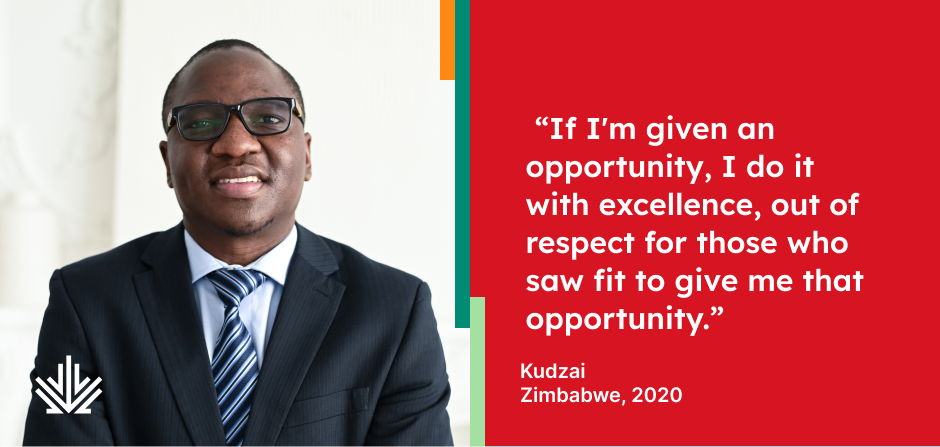From an interview with Kudzai Baloyi, Cards advisor, RBC.
In his home city of Harare, Zimbabwe, Kudzai Baloyi was the marketing director for the country’s largest pharmaceutical firm. From that vantage point, Kudzai had a clear view of the opportunities and limitations in Zimbabwe for him and his family. He looked five to ten years ahead, and saw that his kids would have better opportunities elsewhere. That’s when he decided to leave his senior executive position and start from scratch in Canada––where he knew no one.
There were challenges of course, but Kudzai is change-positive and set out to make his new life a success. He reached out to fellow Zimbabweans on LinkedIn and began to build a new network in Canada. He attended online networking events, which led to his current role at RBC. Kudzai is determined to do everything necessary to make his mark in Canadian marketing and eventually help other newcomers do the same.
When I came to Canada, I left a very good title behind; I was almost at the top of my career. I had quite a few anxieties, because I was coming here with my family and we didn’t know anyone in Canada. I heard stories from other professionals saying that, when you go to a new country you won’t get a lot of opportunities, maybe because of the colour of your skin, or because of your background, or because you don’t have Canadian experience. There’s a saying: “There’s a thin line between faithfulness and foolishness.” When reality set in and my journey was about to start, I wondered how thin the line really was.
It was a leap of faith, but I prepared myself. I thought, “Even if it means starting from the bottom, you always find a way to rise up again, because there’s nothing that can stop you if you have talent.” Back home, I’d seen almost everything in terms of my career, and it was time for me to experience a different type of life for me and my kids as well.
I believed Canada would give our children better opportunities. If I’d stayed in Zimbabwe, in five to 10 years from now I might be comfortable, but what’s the use of being comfortable if you’re going to see your kids struggle, or unable to be independent? So that was really the driving force behind my move.
I was 38 when I applied through Canada’s Foreign Skilled Worker program. For me, 38 was still young. I felt I could restart, show my talent, and move up again. I am adaptable and quite flexible. I am comfortable with change, and quickly adjust to suit the situation I’m in.
Starting your career starts with networking
The most stressful part about coming here was finding a job. Every month you watch your savings go down. Along the journey, I looked for some other Zimbabweans who had also made it to Canada. Through connections, I managed to link up with them. If a person from your home country hears your unique name here in Canada, they often agree to connect with you.
In terms of networking, LinkedIn was my go-to place. Every time I attended a meeting or a session on Zoom, I would make an effort to introduce myself to the panelist and also connect with other newcomers through LinkedIn. Some would respond, others would not.
I also started to make use of newcomer programs offered by various organizations. I remember Wanzi Silva, from RBC’s Newcomer Meeting Place, was one of the panelists at a meeting on how newcomers can develop careers in Canada without Canadian experience. Her presentation on how to take advantage of RBC’s banking opportunities sparked my interest, and I ended up opening a tax-free savings account with her and also told her I was a newcomer and still looking for a job. As a former newcomer herself, she understood what I was going through back then, which made it easier.
I followed up with her and she told me about an opportunity at the RBC Advice Center where I currently work. Based on my experience back home, I knew this was something I could do. I would not break a sweat doing that job. Working at RBC would also provide great exposure to future opportunities. When you’re inside a company, it’s easier to hear about role opportunities than when you’re outside.
Finding your place in Canada
People I met along the way have been very helpful, even telling us how we can find accommodation. It’s very difficult for a newcomer to get accommodation without a credit rating. Landlords may not want to take a chance on you, because they’ll look at your credit score, which will be nonexistent if you just arrived in Canada.
Before I came here, I was fortunate to get contacts for a company that offered furnished apartments. I arranged for a two-month stay and to make payment when I landed. I was also assisted by the fact that, whilst I was back home in Zimbabwe, I managed to open an account with RBC. So I just deposited my proof of funds into the savings account. After the first two months, I needed longer-term accommodation. Fortunately, one of the guys I connected with is into real estate and he helped me secure the place where we currently live.
Kudzai’s top five tips for newcomers
1. Have an open mind.
When you come to Canada, come with an open mind. Come not expecting anything exactly and absorb everything that comes your way.
2. Open new networks.
When you come to Canada, your old networks may be irrelevant. You have to start afresh and make new friends. Reach out to anyone. One guy I met who eventually became a friend told me, “Kudzai, if you tell your story, it can be heard. If you don’t tell it, it won’t.” So, never be shy to tell your story to anyone because, in the process, you can also find someone willing to listen.
3. Do whatever it takes to succeed.
When you decide to give up on your past, it sometimes means you have to restart, like what I’m currently doing. Take that route, even if that means taking a survival job while preparing for your future.
4. Be prepared to Learn.
Learn about the new culture, even within your field. Learn how things are done and get an appreciation for the way you want to go professionally.
5. Never give up.
My view in life is that, if you are talented, you have to work on things that you love. Of course, there might be other easier avenues but if you really believe in your talent as an internationally trained professional, you do not need to give up. You just need to fight and find the space where you can exhibit your talent.
Moving forward and paying it forward
Coming to Canada, my main goal was to give our children better opportunities. I also said, “You know what, I’m still very young, I can also have goals of my own.” Regardless of people who told me I couldn’t make it in marketing here coming from Africa, I said to myself marketing is marketing. Whether you are in the desert or in the Arctic, if you’re selling, you’re still selling. My goal is to make my mark in the marketing field here, whether at RBC or another organization within Canada.
Another important goal I’ve set for myself is that, when I do manage to break through, I will help and mentor other professional marketers, as well as help them navigate the terrain of being a newcomer. I want to find a way for marketing people who come here not to have to settle for manual labour jobs when they have proper qualifications and talent that can be used within the marketing field.
In terms of what I’m doing to work towards my goals, I recently became a member of the Canadian Marketing Association. I always make it a point to attend many of their events. Right now, I’m studying towards a chartered marketer program, which is also offered by Canadian Marketing Association, so that I get to also know how things are done locally and can also build my network with other marketers across Canada.
When I dive into a different environment, the way I manage the situation is I quickly fit into the environment and attempt to quickly feel that I’m part of the environment. Of course, back home I had a very good job and, when you come here, it can feel like all of a sudden you’re a nobody. That kind of shakes you up.
So when you are prepared to say, I’ve already made a lot of sacrifices, I’ve left family and friends back home, and you understand that the environment you’re in, and no one is going to give you anything for free, you just have to fight your way up. When your whole family depends on you, you don’t have the luxury to second guess yourself. You just dust yourself up every morning and keep going. When you get into a brand new environment with that mindset, you quickly adapt on the first step, plan to take the next one and keep moving forward.
Our kids seem to be adapting quite well to life in Canada. In fact, they’re ahead of my wife and I. They hardly talk about back home now, and most of their stories are about their experiences with their friends at school.




